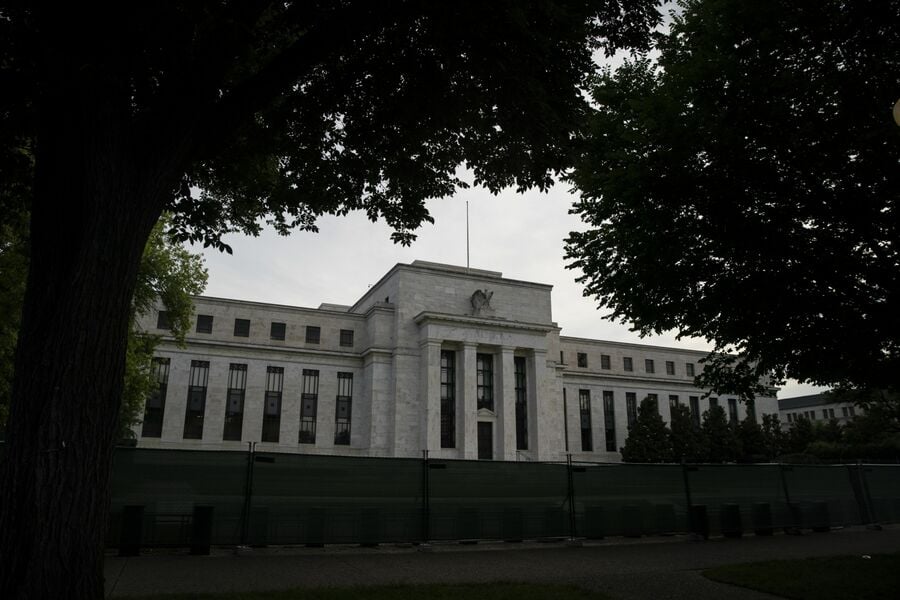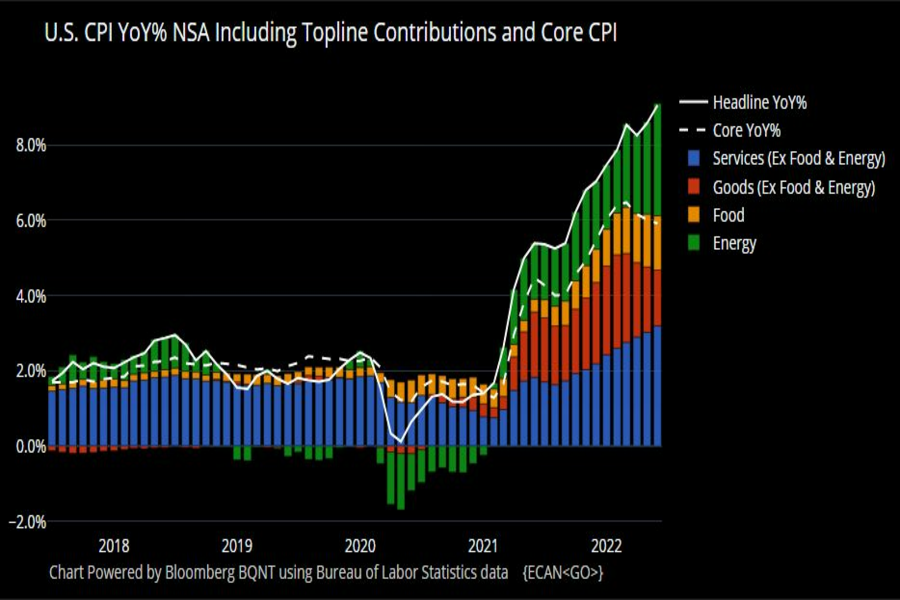

Federal Reserve officials may debate a historic one percentage-point rate hike later this month after another searing inflation report, which cemented odds of at least a 75 basis-point move and boosted expectations for a similar increase in September.
Investors upped bets the central bank could raise rates by 100 basis points at its July 26-27 meeting, which would be the largest increase since the Fed started directly using overnight interest rates to conduct monetary policy in the early 1990s. Futures priced roughly a one-in-two chance of such a hike after consumer prices rose a hotter-than-forecast 9.1% in the year through June.
“I think they have time, if they want, to change that expectation to 100. I don’t think they’ve given us a great reason why they should be going slow here, or being gradual,” said Michael Feroli, chief U.S. economist at JPMorgan Chase & Co.
“If you do in fact, get 100 in July and 75 in September, then I think the growth outlook for later in the year probably deteriorates. Right now I’m inclined to think that the main impact might be to motivate more front loading by the Fed,” he said.

Given the acceleration in monthly inflation, economists at Nomura Securities International now expect a full percentage-point increase in the Fed’s benchmark rate at the upcoming policy meeting.
“Incoming data suggests the Fed’s inflation problem has worsened, and we expect policy makers to react by scaling up the pace of rate hikes to reinforce their credibility,” Nomura’s Aichi Amemiya, Robert Dent and Jacob Meyer, said in a note.
Fed Chair Jerome Powell told reporters last month after the central bank raised rates by 75 basis points, to a range of 1.5% to 1.75%, that either a 50 or 75 basis-point increase was likely in July. A majority of his colleagues since then have either echoed his line or endorsed the bigger move.
Cleveland Fed President Loretta Mester will be interviewed on Bloomberg Television on Wednesday evening. Fed Governor Christopher Waller is scheduled to speak on Thursday, while Atlanta Fed President Raphael Bostic and his St. Louis colleague James Bullard both have events on Friday. After that, officials enter their pre-meeting blackout period.
Central banks globally are confronting unprecedented inflation, prompting historic rate hikes from Hungary to Pakistan. The Bank of Canada on Wednesday increased rates by a surprise full percentage point amid fears that decades-high price pressures are becoming entrenched.
“The Fed is right to worry about the unmooring of inflation expectations — and this report raises the chance of an even larger rate hike than 75 basis points down the line.”
-- Anna Wong and Andrew Husby (economists)
Brett Ryan, senior U.S. economist at Deutsche Bank AG, said it made sense to price in some risk of a larger Fed move, but saw it as unlikely without explicit communication from the central bank.
“The hawks had to have agreed to the guidance of 50 to 75, with the understanding that if we got an upside print, 75 would be the number,” he said. “They have time to communicate if they want to put that message out there.”
The U.S. central bank has pivoted to aggressive policy tightening to confront the highest inflation in 40 years, which critics say was egged on by policy makers’ slow initial response. They raised rates by 75 basis points last month — the largest increase since 1994 — despite previously signaling that they were on track for a smaller half-point move.
“You have to put 100 on the table for July,” said Andrew Hollenhorst, Citigroup chief US economist. “Everybody should be quite cautious about calling peak inflation, a few months ago the peak was supposed to be 8.3%.”

The 25-year industry veteran previously in charge of the Wall Street bank's advisor recruitment efforts is now fulfilling a similar role at a rival firm.

Former Northwestern Mutual advisors join firm for independence.

Executives from LPL Financial, Cresset Partners hired for key roles.

Geopolitical tension has been managed well by the markets.

December cut is still a possiblity.
Streamline your outreach with Aidentified's AI-driven solutions
This season’s market volatility: Positioning for rate relief, income growth and the AI rebound
